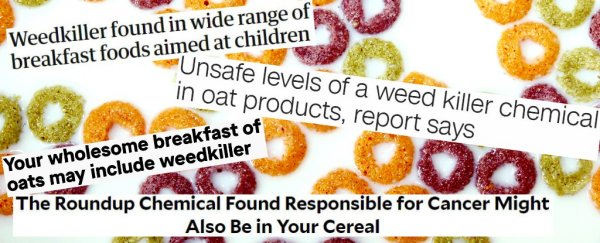"Weedkiller found in wide range of breakfast foods aimed at children", states one headline. And you know what – it's right.
But before you throw out your breakfast cereal in disgust, there are a few important things you should know.
A non-profit called the Environmental Working Group (EWG) released a report on Wednesday - on the internet, rather than published in a scientific journal - saying that nearly all the products they tested exceeded their 'safe' levels of glyphosate - one ingredient in the infamous weed killer Roundup.
The group tested products from Quaker, Kellogg's and General Mills, which make Cheerios, as well as a number of other smaller organic brands.
That sounds terrifying. No one wants to be eating weed killer, especially not in unsafe quantities.
But there's a pretty huge catch. The 'safe' level that the EWG is proposing is an absolutely tiny 0.01 milligrams per day, and it's based on some mental gymnastics on their behalf.
As Susan Matthews explains over at Slate, the group's safe limit is set at one ten-thousandth of what the Environmental Protection Agency (EPA) has deemed safe, at 140 milligrams per day; and one hundred times smaller than California's much more conservative measurement of 1.1 milligrams. As Matthews writes:
Your mileage may vary, but I trust the math of the government agency over the advocacy group that made these hilariously incorrect charts.
So, even according to EWG's own tests, the amount of glyphosate in your cereal is way, way smaller than the minimum safe amount listed by competent government authorities.
But having such a tiny safety threshold definitely makes for scarier headlines, since three quarters of the items they tested were over this self-appointed 'safe' level.
If their tests are accurate, there is indeed a tiny amount of Roundup on some of your food. But unless you're eating literally hundreds of cups of cereal a day, it's unlikely to increase your cancer risk (although eating that much sugary cereal will make you sick).
In fact, there's growing evidence that even if you did manage to overdose on glyphosate-laced foods, that exposure still wouldn't give you cancer.
So it may seem baffling that so many news organisations ran with this story without critically analysing its source, since even a quick Wikipedia search will tell you that EWG's claims are not always backed up by solid science.
But you might remember that, about a week ago, Monsanto was found liable in the first Roundup cancer case, where the plaintiff had been using hundreds of gallons of Roundup. The company has been ordered to pay US$289 million in damages.
Which makes this a perfect time to release a report damning cereals for their glyphosate, creating an atmosphere for dramatic quotes like this one from EWG's president, Ken Cook:
"I grew up eating Cheerios and Quaker Oats long before they were tainted with glyphosate. No one wants to eat a weedkiller for breakfast, and no one should have to do so."
But as a researcher from the School of Medicine in the University of Connecticut writes for The Conversation, this issue in the Monsanto case is far from clear cut.
"In many instances it is simply unknown whether a product and its contents are a danger," he explains.
"This verdict is just the first in what could be a long legal battle over Roundup, and proving causality in such cases is not easy."
All this doesn't mean that Roundup isn't contributing to other problems; but when it comes to having minuscule amounts of glyphosate on our food, not only does the cancer risk appear to be negligible, but its use means more people can be fed while using up less land.
Of course, research on glyphosate is still ongoing. But in a world where we need to feed billions of people while lowering our environmental impact on the planet, you can rest easy knowing that breakfast cereal is the least of your problems.
